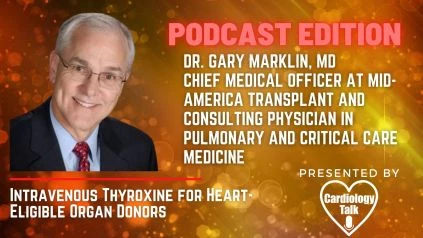Gary Marklin, MD- #IntravenousThyroxine #CardiacOrganDonors #Heart Transplants @midamericantransplant #Cardiology #Re...
Dr. Gary F. Marklin is a pulmonologist in Saint Louis, Missouri, and is affiliated with St. Alexius Hospital-Broadway Campus and Mercy Hospital South.
Dr. Marklin has more than 36 years of experience practicing internal medicine and is a seasoned critical care physician. He has worked as a consulting physician at Saint Anthony's Medical Center in the fields of intensive care, respiratory care, and pulmonary care.
Link to Article: https://clinicaltrials.gov/ct2/show/NCT04415658?cond=Cardiac+Death&phase=23&draw=2&rank=24#contacts
Background: Brain death frequently induces hemodynamic instability and cardiac stunning. Impairments in cardiac performance are major contributors to hearts from otherwise eligible organ donors not being transplanted. Deficiencies in pituitary hormones (including thyroid stimulating hormone) may contribute to hemodynamic instability and replacement of thyroid hormone has been proposed as a means of improving stability and increasing hearts available for transplantation. Intravenous thyroxine is commonly used in donor management. However, small controlled trials have not been able to demonstrate efficacy.
Methods: This multicenter study will involve organ procurement organizations (OPOs) across the country. A total of 800 heart-eligible brain dead organ donors who require vasopressor support will be randomly assigned to intravenous thyroxine for at least 12-hours or saline placebo. The primary study hypothesis is that thyroxine treatment results in more hearts transplanted. Additional outcome measures are time to achieve hemodynamic stability (weaning off vasopressors) and improvement in cardiac ejection fraction on echocardiography.
Discussion: This will be the largest randomized controlled study to evaluate the efficacy of thyroid hormone treatment for organ donor management. By collaborating across multiple OPOs, it will be able to enroll an adequate number of donors and be powered to definitively answer the critical question of whether treatment increases hearts transplanted and/or provides other hemodynamic benefits.



